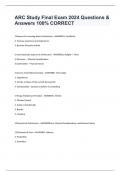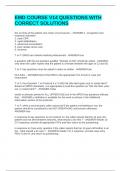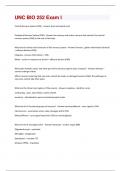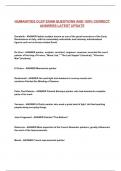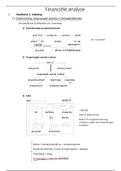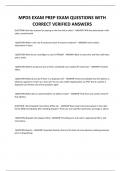Chapter 1: Introduction to African Politics:
Why Study African Politics?
• Study of comparative politics
• Africa provides an important source of:
- Political ideas
- Process
- Institutions (state and non-state)
- Abundance of case studies to analyse
• The continent is home to almost every different type of political regime imaginable,
we have examples of autocratic/authoritarian regimes (one side of the scale) all the
way to fully fledged democracies with hybrid regimes and flawed democracies in
between.
• Some African governments have adopted very socialist orientations while others
have adopted very liberal constitutions.
• Some states are the model of stability while others are on the verge of political
collapse
• Some parties adopt very competitive, multi-party elections and others that are
characterised as being one party dominant states.
• There are also a myriad of social divisions and social cleavages evident on the
continent primarily based on ethnicity, religion, class, gender and to a lesser extent
race. All of these differences need to be managed by political leaders in order to
maintain political authority, legitimacy and order. And it is the politics that these
realities create which makes Africa really stimulating to study.
• Students need to abandon any prejudices
Perceptions of Africa:
• The average western views of Africa tend to be very negative. Africa is often
characterised as a continent of corruption, famine, diseases, disasters and civil wars.
Although these do exist from time to time, they aren’t the sum of African politics.
• What perpetuates these stereotypes?:
- Media selectivity major news broadcasters only share specific images and
relating content about Africa negative light as they reinforce child soldiers,
warring tribes, people in mud huts, very little sanitation and running water,
starving children sell newspapers these reinforce the stereotypes to Global
north
- People’s own ignorance
Testing or own knowledge:
• Sub Saharan Africa = everything under Sahara desert
• Diaspora = people originally from the continent that no longer live on the continent
,Africa at a glance:
• Extensive landmass
• 54 independent states each state is unique and has its own set of politics
• Not homogenous
- Territory size Gambia (West Africa) very small (11000 square km) vs Algeria
(North Africa) is 210 times larger than Gambia
- Population Nigeria (West Africa) over 190 million vs Lesotho (south) just over
2 million
- Vegetation Botswana is largely arid whereas you’ll have very lush, tropical,
green vegetation in Congo
- Political system
- Ethnicity Ethiopia is racially homogenous whereas SA is racially diverse
- Culture
- Language
- Religion North Africa is predominantly Muslim, Christianity is practiced in the
South
• Reason why we can’t talk about one African culture
Studying of Africa:
• Explore the political relationship between three actors:
1. The state A set of political institutions that govern within a delimited sovereign
territory
2. Civil society the organizations that arise out of voluntary association within society,
found between the extended family and the state
3. External interests foreign governments, international institutions and non-
governmental organizations (including transnational corporations)
, • Africa’s political development since independence = a realignment of power among
these three groups
What can you expect to learn?:
Africa’s place in international relations
Africa’s pre-colonial and colonial history
Africa’s political ideologies
Ethnicity and religion in Africa
Personal rule and military intervention in Africa
External influences and Africa’s political economy
Legitimacy and democracy in Africa
Chapter 12: Africa’s place in International relations:
Africa and IR theory:
• Western dominance of IR theory been very little development within Africa and
Asian economic powerhouse eg China, Japan, Korea or even India
• Is existing IR theory (in)appropriate to the African experience?
• Huntington’s “clash of civilisation” collapse thousands of cultures into a totalised
“African civilisation” however Africa isn’t homogenous thus can’t talk about one
culture or one set of African values. Important because the hypothesis states that it
will be people’s cultural and religious identities that are going to be the primary
source of conflict in the post-cold war world.
- As early on as 1992 Huntington argued that future wars were going to be fought
not between countries, but between political cultures. He even went on to say
that Islamic extremism will be one of the biggest threats to world peace which
subsequently did become evident
• Additional reading: Odoom and Andrews
• Cold War era: strategic interest for Superpower competition or “backwards”
backyard Africa has been considered as a peripheral concern for the major
powers. When the collapse of the soviet union took place, the continent’s major
diplomatic tool (exploiting the superpower rivalry that existed on the continent)
disappeared
, • Post-Cold War: Asia and Eastern Europe preoccupy Western Europe and USA (Asian
economic disasters, civil war in the Balkans, capitalist transition of eastern Europe)
still peripheral concern. Result = Africa falling further off the world stage because
western powers decided to let Africa solve their own conflicts despite very
destructive wars in DRC and Sierra Leon in the mid 1990s
This marginalisation of Africa by western policy makers directly correlates with the
country’s marginalisation by the dominant western produced IR theories and as a
result Africa has long been absent in theorising about world politics. There is
however a very strong Africanist critique of the current IR discourse. There are a
number of critiques:
Neorealism: focuses on the “great” powers of IR neither Africa nor the rest of the
third world have any place in neo-realists systematic analysis so simply ignored
Classical realism: little use for Africa one of the most famous classical realist
theorists, Hans Morgenthau, went on to refer to Africa in 1973 as “a politically empty
space”
Neo-liberalism: continent lacks hegemonic power when neo-liberals do focus on
Africa they are more focused on development theories which of course aim to
reproduce western economic political as well as cultural ideas.
Structuralist theories: expose historical specificity and exploitative structure BUT
also replicate Western biases by viewing the continent as solely a part of the global
periphery (agency-less against the great powers – Africa only exists to the extent to
which it is acted upon) eg Marxism and dependency and world system
approaches appear to refocus IR on Africa. Actually use Africa to illustrate the
exploitative and hierarchical nature of the existing world’s systems.
Africa exists at the centre of various paradigms and discourses largely ignored by
traditional IR theory. Africa exists in the centre of global discourses:
- Environment
- Biodiversity and ecology
- Gender
- Human security
- Migration flows
- Land mines
- Development
- Non-governmental organisations (NGOs)
- International financial institutions (IFIs)
- Structural Adjustment Programmes (SAPs)
• Africa may be marginal when it comes to traditional security discussions but the
continent is very much front and centre to discourses on new security issues which
focus on the environment, women’s body, human welfare and sustainable
development.
• Africa has a central position in the practice of IR but not necessarily the theory of IR
• Deconstructing traditional IR theory shows Africa holds a central and problematic
position Africa is the periphery to the core, Africa are the small states upon which
the great powers act. Have the post-colonial scholars like Baba and Fernon who
argue that Africa actually provides the mirror in which the West defines itself.
Essentially that Africa is the other that is necessary for the construction of a mythical
Western self. Evident that the core cannot exist without the periphery, but the


